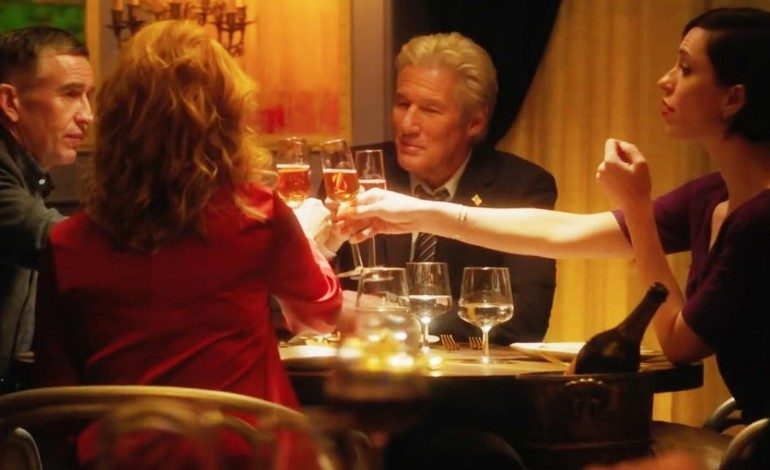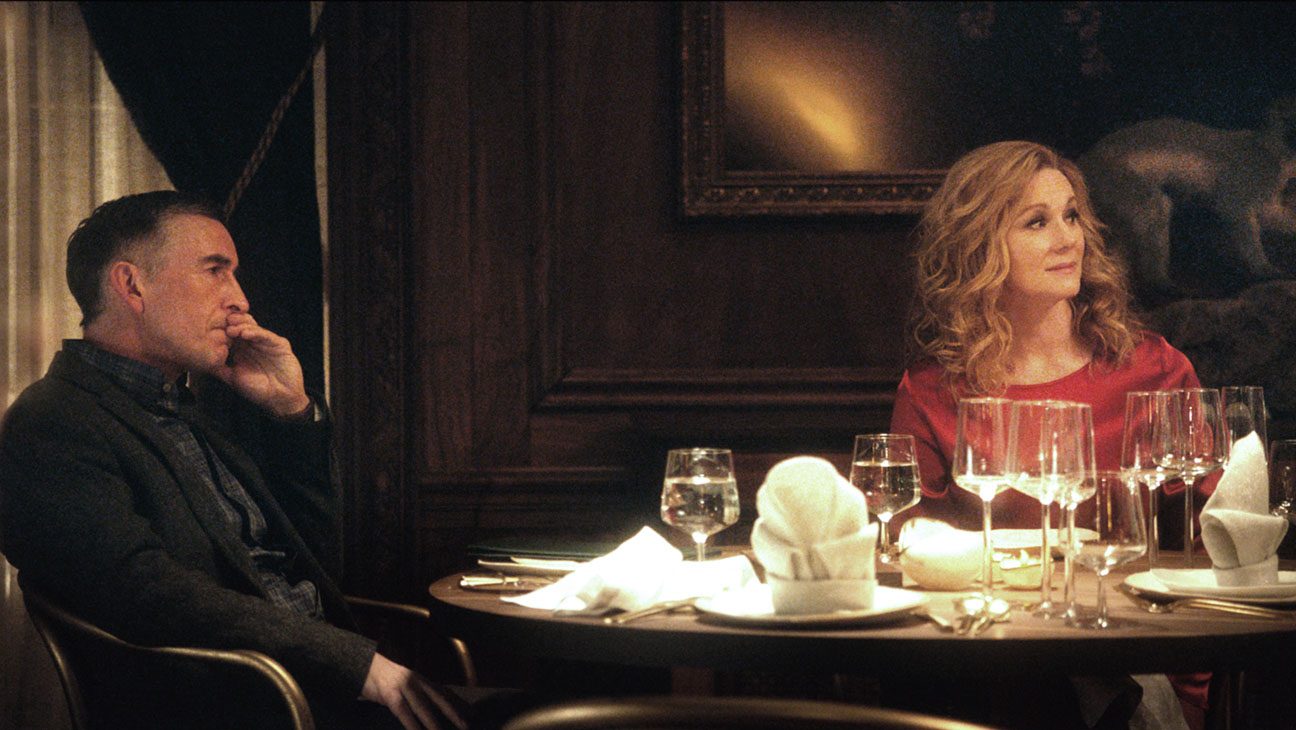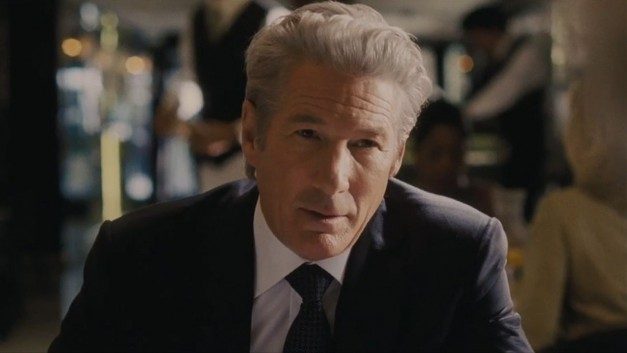

One cannot help but feel hopefully excited at the prospect of seeing Richard Gere, Steve Coogan, Rebecca Hall, Laura Linney and Chloë Sevigny all under one cinematic roof. Coupled with the fact that The Messenger (2009) writer and director Oren Moverman is helming the project, it’s easy to see why The Dinner should be one of the more anticipated films of the post-Oscar season. Unfortunately, it seldom does stir any filmic appreciation, instead coming off as a bizarrely disjointed attempt at an intimate, multilayered family drama.
You almost forgive the film for its banal characterizations, its strangely over-the-top reliance on zooms, and meandering focus. Save for a masterful turn by Richard Gere and few twinkling moments from Linney and Hall, The Dinner misses many of the marks that made Herman Koch’s brilliantly sardonic novel of the same name so strangely enticing. The Dinner tells the tale of Stan and Paul Lohman—the former a prominent politician (Richard Gere) and the latter a former history teacher (Steve Coogan)—who must discuss at a fanciful and exclusive restaurant what to do after their respective sons committed a violent crime together. Although the boys have not been identified, the CCTV and cellphone footage shot by one of the sons becomes a national media sensation and it is only a matter of time before it all comes pouring out.
It is a story that is, on first glance, intriguing. The film showcases many notes of melodrama: suspense, rivalry, jealousy, spitefulness, love, respect, peripeteia, virtue, among others. It is a film that is strongly intimate, dialogue driven and thought-provoking. At least, it should have been. Unfortunately, the film seldom demonstrates its inherent strengths, instead relying on a disjointed narrative to progress the film’s rather ambitious story. It really is a shame, for Moverman’s penning of the superb I’m Not There (2007) and the magnificent Love and Mercy (2014) demonstrates the filmmaker’s penchant for adapting wildly difficult tales. It appears that that same proclivity for making skillfully nuanced dramas has not translated to his directorial work in The Dinner.
And while Moverman did an outstanding job directing his screenplays in The Messenger, Rampart (2011) and Time out of Mind (2014), it appears that the filmmaker has finally hit his first dud with The Dinner. Moverman seems to be attempting to narratively and stylistically stitch together Love and Mercy (for its nonlinear narrative) and The Messenger (for its small-scale intimacy), albeit to little success. But beyond his own works, it seems that Moverman is also inspirationally dipping his toes into the waters of Roman Polanski’s similarly adapted family drama, Carnage (2011).
While many critics enjoyed Polanski’s film, it was nonetheless assessed as being a lower-rung version of the Tony-winning play it was based on. But nonetheless, the film proved to be a brilliant adaptation that adeptly showcased a descent from social niceties to overt maliciousness. It was intimate, singular in space and relied on a quartet of brilliant actors to carry the film. Nevertheless, the film will always be stuck in the shadows of its adapted work. It appears that The Dinner is set to suffer the same fate, forever attempting to catch up to the source material. Compared to Koch’s original effort, Moverman’s film is a pale shadow of the original work. Having already been adapted for the screen twice over by Dutch filmmaker Menno Meyjes in 2013, and Italian director Ivano De Matteo in 2014, Moverman has stepped in to provide the Hollywoodified version of the tale. Unfortunately, the irony of the original work is lost in translation.
The novel is as brilliant as it is due to the inherent commentary—it is deeply rooted in modernist European aristocracy that is continuously undermined by the underlying savagery and viciousness of each spoken word and uncovered detail. It is a book that is ostensibly critiquing the hypocrisy of western society—acting as the worldwide morality police and yet demonstrating continuous cruelty in public policy and international affairs. While the façade may be one of pleasantness, friendliness and humanism, the underlying creature (or the Eurocentric Freudian id) is one that rancorous, egotistical and animalistic. As American novelist Clair Messud writes in her book review for the New York Times, the book is “attuned to a distinctly European society, one simultaneously more ostentatious in its apparent ‘civilization’ and more ashamed of its underlying savagery.” It is a work that is wholly reliant on Northern European ideologies and sociocultural milieus.
And while Moverman touches upon this multilevel criticism through the irony between the high-brow setting and a discussion of a violent, abhorrent crime that their sons committed, it is one that is only superficially explored. It is not an inherent aspect of this narrative as it was with the novel. Which is too bad, for the irony could have easily and appropriately been translated to the Americanized version of the story. For who else does this wry commentary apply to more than the United States, who for the past hundred years has controlled or influenced (or at least tried to) much of the world’s sociopolitical agenda? And sure, the allusions between America’s violent past (personified by Paul’s obsession with Gettysburg) and the violence of his child is touched upon, it is done so in a befuddled manner that loses traction and focus as the film peels its dark, twisted layers.
It seems as though the film is in a continuous identity crisis, not sure whether it should focus on the intimate drama unfolding between the two couples, the violent crime the kids committed, the mental illness of Paul and its potential influence on his child or the tumultuous relationship between Paul and Stan. Oscillating between all of these narrative threads, Moverman seldom gives any one strand enough time and attention to fully flush them out.
Verdict: 2 out of 5
The Dinner is, sadly, a poor addition to Moverman’s rather lauded cinematic repertoire. Which is too bad because The Dinner is the kind of movie that you desperately want to be good. With such a star studded cast and talented screenwriter-cum-director attached, The Dinner does everything right on paper. But it unfortunately does not translate to well-rounded and artistically pleasant work. Perhaps the film’s mediocrity is due Moverman’s adapting another work or because he was not originally slated to direct the work (Cate Blanchett was initially attached in what was to be her directorial debut). In any case, The Dinner is a film that stretches itself out too thin and seldom contains the substance it needs to make it narratively pay off in the end.


